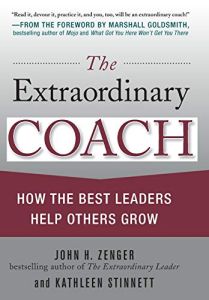Join getAbstract to access the summary!

Join getAbstract to access the summary!
John H. Zenger and Kathleen Stinnett
The Extraordinary Coach
How the Best Leaders Help Others Grow
McGraw-Hill, 2010
What's inside?
Despite what many managers may think, coaching has nothing to do with giving advice.
Recommendation
Managers who try to coach their employees often make wrongheaded assumptions about what their staffers think. They offer unhelpful advice about what staffers should do to improve their work, and this is exactly what coaching should not be. Human Resource Development Hall of Famer John H. Zenger and his colleague Kathleen Stinnett spell out everything for managers who haven’t a clue about coaching or how to conduct coaching sessions. getAbstract recommends discovering whether you need this helpful manual in much the same way that the authors suggest using when you conduct coaching sessions: by asking questions. Do your employees need coaching? Do you feel ready to coach? What can you do to learn more about being a coach? Would reading thoughtful information about coaching help? If so, this is the book for you.
Summary
About the Authors
John H. Zenger co-founded Zenger/Folkman, an executive education firm where Kathleen Stinnett is a senior consultant and executive coach.




















Comment on this summary
Many thanks for autho John H.Zenger about his/her in-depth study on coaching.